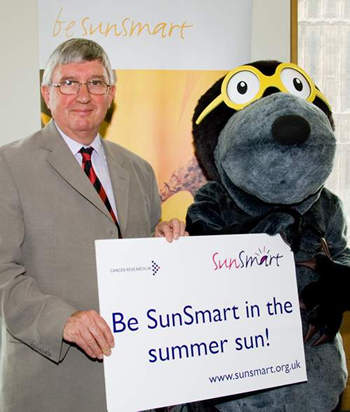MP learns how to stay safe in the sun
2nd July 2007
Aberavon MP, Dr Hywel Francis met with Cancer Research UK's SunSmart team recently to learn about skin cancer and how to stay safe in the summer sun.
Cancer Research UK organised a special Molewatch Clinic, which was staffed by dermatologists and specialist skin cancer nurses, to promote skin cancer awareness and the importance of being SunSmart this summer.

Dr Francis meeting the Molewatch Mole when he attended the clinic
Dr Francis said,
"It is important to be safe in the sun and to avoid burning. All types of sunburn can cause permanent and irreversible skin damage and can double your risk of skin cancer.
"I urge my constituents to speak to their GP if they have concerns about a particular mole, freckle or patch of skin that has changed over a period of weeks."
A national survey* for SunSmart - the UK's national skin cancer prevention campaign commissioned by the UK Health Departments and run by Cancer Research UK - found that 30 per cent of 16-24 year olds said that they were certain to get sunburnt on their summer holiday. And a further 30 per cent said that they might get sunburnt.
The survey questioned 2000 men and women of all ages throughout Britain about their sunbathing habits. Overall more that a quarter of adults (27%) thought getting burnt was all part of getting a tan.
Rebecca Russell, Cancer Research UK's SunSmart campaign manager, said,
"Getting sunburnt increases the risk of skin cancer in general. But the kind of sunbathing binges that happen when people go to much hotter climates and bake on the beach is particularly dangerous.
"This kind of short intense exposure to the sun, leading to burning, particularly increases the risk of malignant melanoma. And each year in Britain almost 2000 people die from this form of skin cancer."
Ms Russell added that it was particularly worrying that more than a quarter of people surveyed believed burning was all part of getting a tan.
"Rates of melanoma are set to treble in the next thirty years unless there is a radical change of behaviour among holiday makers addicted to sunbathing."
To reduce the risk of skin cancer and enjoy being out in the sun, the SunSmart campaign encourages people to know their skin type and use the UV index to find out when they need to protect themselves. They should also follow the SunSmart key messages:
- S pend time in the shade between 11 and 3
- M ake sure you never burn
- A im to cover up with a t-shirt, hat and sunglasses
- R emember to take extra care with children
- T hen use factor 15+ sunscreen
Also report mole changes or unusual skin growths promptly to your doctor.
More information on skin cancer and the Cancer Research UK SunSmart campaign is available from Cancer Research UK's SunSmart website: www.sunsmart.org.uk
For media inquiries, please contact the Cancer Research UK press office on 020 7061 8300.
Notes to Editors:
*Survey by BMRB Omnibus between the dates 2nd – 11th February 2007, conducted over the telephone among 2000 adults aged 16 +. Results were weighted in order to make them nationally representative.
**Research says that sunburn doubles the risk of melanoma. (References: Gandini et al. 2006. Meta-analysis of risk factors for cutaneous melanoma II; Sun exposure Elwood & Jopson. 2006. Melanoma and sun exposure: an overview of published studies).
SunSmart is the UK's national skin cancer prevention campaign commissioned by the UK Health Departments and run by Cancer Research UK. The campaign focuses on those most at risk of skin cancer and the key target audience this year is holidaymakers.
- Skin cancer is one of the most common cancers in the UK.
- The number of skin cancer cases is increasing year on year. The main risk factor for skin cancer is exposure to sunlight. Up to 90% of skin cancers could be prevented by being SunSmart.
- Over 75,000 new cases of skin cancer are registered each year in the UK. Some experts estimate the number of cases to be in excess of 100,000 as many cases are not reported.
- Each year over 1,800 people die from malignant melanoma.
- Cases of malignant melanoma have more than doubled over the past 20 years. Malignant melanoma is the second most common cancer for 20-39 year olds.
- Over the last 20 years, malignant melanoma incidence has increased faster than any other cancer.
- There are more skin cancer deaths in the UK than in Australia, even though Australia has more cases of the disease.
Find out more at www.sunsmart.org.uk
